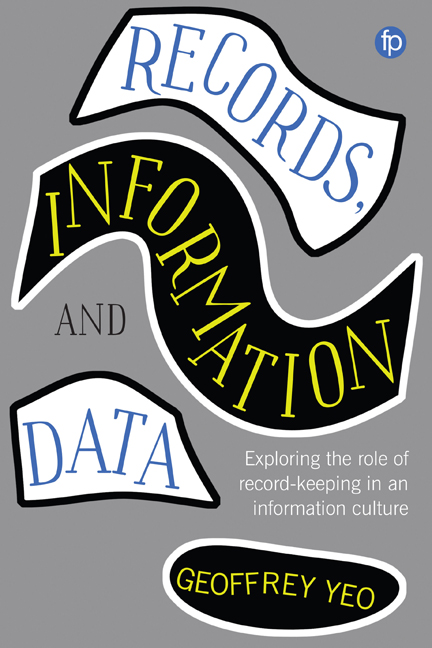Book contents
- Frontmatter
- Contents
- Introduction
- 1 The Making and Keeping of Records: a Brief Historical Overview
- 2 Thinking About Records and Archives; the Transition to the Digital
- 3 Archivists, Records Managers and the Rise of Information
- 4 Finding a Way Through the Hall of Mirrors: Concepts of Information
- 5 Records and Data
- 6 Representation, Performativity and Social Action: Why Records Are Not (Just) Information
- 7 Managing Information or Managing Records?
- Concluding Thoughts: Record-Keeping Present and Future
- Index
7 - Managing Information or Managing Records?
Published online by Cambridge University Press: 24 September 2019
- Frontmatter
- Contents
- Introduction
- 1 The Making and Keeping of Records: a Brief Historical Overview
- 2 Thinking About Records and Archives; the Transition to the Digital
- 3 Archivists, Records Managers and the Rise of Information
- 4 Finding a Way Through the Hall of Mirrors: Concepts of Information
- 5 Records and Data
- 6 Representation, Performativity and Social Action: Why Records Are Not (Just) Information
- 7 Managing Information or Managing Records?
- Concluding Thoughts: Record-Keeping Present and Future
- Index
Summary
Introduction
The view that information is an affordance – an intangible benefit that records or other resources afford to those who use them in particular ways – is not a view likely to be shared by proponents of ‘information management’. Influential voices now affirm that, at least in organ - izational settings, information is an objective commodity, which can and should be controlled, managed and systematised. Other voices, often equally influential, affirm that record-keeping and information management practices have converged and that there is now, or should now be, no effective difference between them. Yet we have seen that, at a conceptual level, our understandings of records and our understandings of information diverge considerably. Records play complex roles in social action, which transcend the capture or supply of information; ideas about information are commonplace in writings about record-keeping, but do not appear to provide an adequate basis for comprehending the complexity of records and their functioning in human society. We seem to have reached a point of critical difficulty, especially if we want to build bridges between conceptual understandings and the field of professional practice.
With this difficulty in mind, this chapter looks more closely at how information and its management are perceived by information managers, and at how the concepts and working practices of ‘information management’ – as they are commonly understood by information managers and data administrators – relate to concepts and practices of record-keeping. Building on the arguments put forward in earlier chapters, it examines points of contact as well as points of divergence, but concludes that record-keeping has different aims and scope and must therefore remain a distinct practice.
Conceptions and practices of ‘information management’: information as proposition
Although the term ‘information management’ is widely used, and its practice widely advocated, in government agencies and commercial businesses in 21st-century western societies, its conceptual framework and operational scope are not always wholly clear. Its proponents rarely agree on precisely what is meant by ‘information’, and sometimes affirm that each organization needs to define the term in its own way to suit its own needs.
- Type
- Chapter
- Information
- Records, Information and DataExploring the Role of Record Keeping in an Information Culture, pp. 163 - 190Publisher: FacetPrint publication year: 2018



